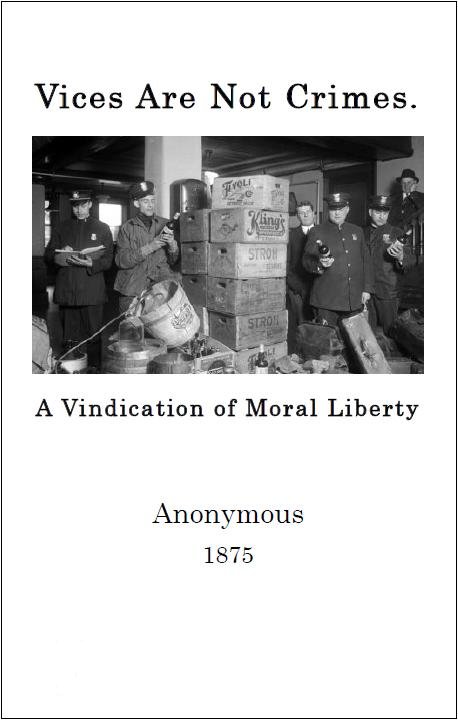C4SS has teamed up with the Distro of the Libertarian Left. The Distro produces and distribute zines and booklets on anarchism, market anarchist theory, counter-economics, and other movements for liberation. For every copy of Lysander Spooner’s “Vices Are Not Crimes” that you purchase through the Distro, C4SS will receive a percentage. Support C4SS with Lysander Spooner’s “Vices Are Not Crimes“.
$2.00 for the first copy. $1.00 for every additional copy.
This classic attack on political prohibition and moralistic law-making was first published anonymously in 1875, as a chapter in the anthology “Prohibition a Failure: or, the True Solution of the Temperance Question.” It was revealed as the work of the radical legal theorist Lysander Spooner soon after his death in 1887, but posthumous collections of his works failed to include it. After the essay was rediscovered and circulated by Carl Watner in 1977, it quickly became one of Spooner’s most popular essays — but remained notoriously difficult to find in print. Until now.
VICES are those acts by which a man harms himself or his property. Crimes are those acts by which one man harms the person or property or another. . . . For a government to declare a vice to be a crime, and to punish it as such, is an attempt to falsify the very nature of things. It is as absurd as it would be to declare truth to be falsehood, or falsehood truth. . . .
IT is only those persons who have either little capacity, or little disposition, to enlighten, encourage, or aid mankind, that are possessed of this violent passion for governing, commanding, and punishing them. If, instead of standing by, and giving their consent and sanction to all the laws by which the weak man is first plundered, oppressed, and disheartened, and then punished as a criminal, they would turn their attention to the duty of defending his rights and improving his condition, . . . enabling him to stand on his own feet, and withstand the temptations that surround him, they would, I think, have little need to talk about laws and prisons for either rum-sellers or rum-drinkers, or even any other class of ordinary criminals. If, in short, these men, who are so anxious for the suppression of crime, would suspend, for a while, their calls upon the government to aid in suppressing the crimes of individuals, and would call upon the people for aid in suppressing the crimes of the government, they would show both their sincerity and good sense in a much stronger light than they do now. . . .








